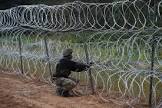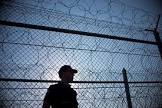- Return to sender - 20th February 2026
- Legal eagle - 19th February 2026
- Round Robin - 19th February 2026

During 23 years with the BBC, and 40 years in journalism, for our Editor Welshman Phil Parry, challenging power (whether from governments, individuals, or corporations) has been central, as it is used in attempting to muzzle whistleblowers and prevent information being revealed, but now comes new evidence that it is being employed more than ever – this time by nation-states erecting fences in a bid to control immigration.
But this, too, is unlikely to be successful.
 Earlier Phil has described how he was helped to break into the South Wales Echo office car when he was a cub reporter, recalled his early career as a journalist, the importance of experience in the job, and making clear that the‘calls’ to emergency services as well as court cases are central to any media operation.
Earlier Phil has described how he was helped to break into the South Wales Echo office car when he was a cub reporter, recalled his early career as a journalist, the importance of experience in the job, and making clear that the‘calls’ to emergency services as well as court cases are central to any media operation.
He has also explored how poorly paid most journalismis when trainee reporters had to live in squalid flats, the vital role of expenses, and about one of his most important stories on the now-scrapped 53 year-old BBC Wales TV Current Affairs series, Week In Week Out (WIWO), which won an award even after it was axed, long after his career really took off.
Phil has explained too how crucial it is actually to speak to people, the virtue of speed as well as accuracy, why knowledge of history and teaching the subject is vital, how certain material was removed from TV Current Affairs programmes when secret cameras had to be used, and some of those he has interviewed.

He has disclosed as well why investigative journalism is needed now more than ever although others have different opinions, how the coronavirus (Covid-19) lockdown played havoc with media schedules, and the importance of the hugely lower average age of some political leaders compared with when he started reporting.
They try, but (I’m glad to say) don’t always win.
Governments, officials, and big corporations attempt to stop the free flow of information or individuals, or scare employees into keeping quiet so that they will not reveal what is going on.

Often they resort to the law.
‘Gagging clauses’ are used in contracts to stop people coming to journalists like me, where they can disclose dubious internal practices.
Threats of libel are issued to prevent the public knowing certain types of information, which, it is thought, may show them in a poor light.


I am very pleased to say that some are brave enough to come forward anyway, ignoring the threats from their employer that they are breaking their contract – determined that they, along with others, should bring out details about what is happening inside the organisation.
I can’t say, though, that everything that should be disclosed is, and today there are extremely worrying signs that these attempts to ‘control’ things are increasing.
They include the use of legal intimidation, especially in trying to stop illegal (as well as ‘legal’ – the two are often confused) immigration.

But, as with preventing information from emerging, there must be grave doubts about whether using barriers and fences will do much to control immigration.
The plain fact is that it is a fundamental human characteristic to want to shield yourself and your family from harm, as well as come to a place which has a better standard of living.
There is far more likelihood of success if you stop those people wanting to leave their home countries in the first place.

Yet still fatuous attempts are made to stop immigration, and between 2014 and 2023 the total length of border fences in the EU rose from 315 to 2,163 kilometres.
Another 245 kilometres will go up this year.
Fences first spiked in popularity during the Syria-driven migrant crisis of 2015-16, and now, with pandemic-era restrictions gone, illegal migration is back in full spate.


Frontex, the EU’s external-border agency, registered 380,000 illegal border crossings last year, the highest number since 2016.
It is clear that Europe is turning to fences to stem the tide and confront Russian hostility.
Nowhere is that more obvious than along its eastern border, where Russia and Belarus have engineered migrant influxes into Poland, Latvia, Lithuania and Finland.

Each responded with barbed wire. The costs, though, are immense.
Poland, which decided to build a €353 million ($407 million) electric fence along its border with Belarus in 2021, kitted out its Russian border with state-of-the art cameras and motion detectors for €80 million last year.
Finland will shell out €380 million to fence off just 200 kilometres, or 15 per cent, of its 1,340 kilometre-long border with Russia by 2026; maintenance costs are on top of that.

Fences are pretty poor value for money. For all its high-tech gadgets, Poland’s fortified border failed to prevent a surge in crossings last year.
Slovenia took down its fence with Croatia in 2022 after it failed to bring numbers down.
In the context of today’s reality, this seems an odd way to spend cash.

Europe is hardly being flooded with migrants, with unauthorised visits accounting for just 0.13 per cent of all external crossings in 2022.
Most enter via the Mediterranean, not the Balkans or the eastern land borders.
Large-scale migration from Russia is “not a very big risk”, admitted Colonel Marko Saareks, deputy chief of Finland’s Border and Coastal Guard, “(but) we have to prepare anyway”. Besides, “any kind of physical obstacle in one area…just shifts the movement to other areas,” sated Chris Borowski from Frontex.
So it’s another attempt at control which is likely to be unsuccessful.

In other areas, anyway, we can be grateful for that…
The memories of Phil’s astonishing decades-long award-winning career in journalism (during which challenging control was often paramount) as he was gripped by the rare disabling condition Hereditary Spastic Paraplegia (HSP), have been released in a major book ‘A GOOD STORY’. Order it now!

Regrettably publication of another book, however, was refused, because it was to have included names.
Tomorrow – how headlines that a prominent Tory MP is being lined up to take over as leader from beleaguered Rishi Sunak shines the spotlight on the fact that she has been condemned as a ‘hypocrite’ for attacking the 20 mph speed policy in Wales, when she has herself admitted to a court driving over the limit.









